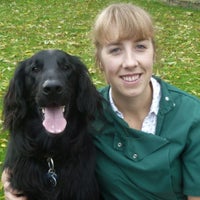
As pet parents, our dogs are an important part of the family, so keeping them happy and healthy is one of our top priorities. Pet owners often worry about the big stuff such as cancer, broken bones, and diabetes, but there are other more common issues that you should be aware of too. Read on to explore these health problems and how to keep your dog as fit as possible.
What Are The Most Common Diseases In Dogs?
A large-scale UK study from the Royal Veterinary College and The Kennel Club looked at the veterinary records of 22,333 dogs in the UK to determine the most commonly diagnosed disorders in veterinary practices. The data for this study was collected through the VetCompass research project, and uncovered that the most commonly diagnosed disorders in dogs were:
Gum disease (12.5%)
Ear infections (7.3%)
Obesity (7.1%)
Overgrown nails (5.5%)
Anal sac impaction (4.8%)
Diarrhea (3.8%)
Vomiting (3.1%)
Lameness (2.7%)
Arthritis (2.3%)
The study found that 65.8% of dogs had at least one of these disorders, and older dogs were found to have more health problems than younger ones, as you might expect[1].
Find out more about what to look out for and how to treat common ailments in dogs below.
Spotting, Treating, And Preventing Common Illnesses
Signs Of Gum Disease
Periodontal disease, commonly known as gum disease, is the biggest problem for dogs. That’s why it’s best to start brushing your dog’s teeth from an early age so that they can get used to it. The below symptoms may indicate an issue:
Tartar (a grey/brown calcified material on the teeth)
Gum inflammation
Smelly breath
Treatment usually involves cleaning their teeth and possibly tooth extractions under general anesthetic with your veterinarian. It’s important to take your dog for regular check-ups and stay on top of at-home oral care to help prevent gum disease from occurring.
Checking For Ear Infections
Ear infections are painful and can vary in severity. Some classic signs include inflammation, increased ear wax or discharge, and an increased odor. If your dog is shaking its head or scratching at the affected ear, this could indicate an infection, and you should take your dog to your veterinarian for an ear examination.
Most ear infections are treated topically with antibiotics, antifungals, and anti-inflammatories. Ear infections can be a secondary symptom of skin allergies[9], and certain breeds are more prone to these issues[8].
Maintaining A Healthy Weight
Recent studies suggest that up to 60% of dogs are either overweight or obese[2]. This means a high proportion of pets are more prone to conditions such as cancer, diabetes, and joint disease[3]. Therefore, one of the best things you can do for your dog is to keep them at a healthy weight.
The best way to keep track of your pet’s figure is to use body condition scoring. If you need help with an appropriate diet and weight loss regime for your dog, make an appointment with your veterinarian.
Keeping Nails Trimmed
Many dogs have long claws, which can cause discomfort and put them at higher risk of nail injuries. This can be caused by several factors, such as limited walking on hard surfaces, which naturally helps to wear claws down. If you’re struggling with nail trimming due to a lack of confidence, or if your dog becomes easily stressed by the process, speak to your veterinarian for tips or book regular nail trims.
Anal Sac Impaction
The anal sacs (or anal glands) are found just inside the anus, and they collect scent-marking secretions which are then naturally expelled when your dog passes a stool. However, some dogs experience issues with their anal sacs becoming uncomfortably full, which increases the risk of infections, and may require manual expression. If you notice your dog scooting their bottom on the floor, licking at their bottom excessively, or a fishy odor, they may be suffering from anal gland issues. If this is the case, your veterinarian might suggest increasing the fiber in their diet or giving them a fiber supplement to help with this.
Treating Diarrhea
There are a number of things that could cause your dog to have diarrhea, including dietary indiscretion (eating something outside of their normal diet), infectious disease, parasites, and organ malfunction. Acute diarrhea, which occurs suddenly, is one of the most common reasons why owners seek help from a veterinarian[5]. However, many cases of diarrhea are simple, and evidence has shown that a probiotic paste can reduce the need for any further veterinary treatment[4].
While it’s impossible to stop your dog from ever getting diarrhea, it’s helpful to keep them up to date with their vaccinations and parasite treatment, as well as feeding them a good-quality complete diet.
Causes Of Vomiting
There could be a number of reasons why your dog starts vomiting. While most of these are related to digestive disorders, a percentage are related to non-gastrointestinal diseases such as kidney failure[6]. This means vomiting is a very non-specific symptom, and you should always speak to your veterinarian if you have concerns about your dog.
To help reduce the risk of vomiting, it’s important to keep up to date with vaccinations and parasite treatment, as well as avoiding giving your dog items that could act as foreign bodies and cause an obstruction if ingested (such as bones, fruit stones, and broken toys).
Noticing Signs Of Lameness
Lameness is a term used to describe a variety of disorders that can affect dogs. Limping is a common sign of lameness, which can be caused by different things, including a torn dew claw, cut pad, or broken limb. If you notice your dog is limping, it could mean they are in pain, and it should always be explored further. Depending on the underlying cause, treatment may include non-steroidal anti-inflammatories and other painkillers.
To keep your dog healthy and reduce the risk of certain types of lameness, keep their nails trimmed and make sure they’re fed an appropriate complete diet, suitable for their age and size.
Spotting Arthritis In Dogs
Osteoarthritis, known as arthritis, is a common joint disease seen in ageing dogs. It’s caused by gradual wear of the cartilage that acts as a cushion in the joints, and can lead to inflammation, pain, and secondary bone formation. Although any dog can be affected, dogs that are overweight or have joint abnormalities (such as hip or elbow dysplasia) are more likely to develop this condition. If your dog has arthritis, they may experience varying degrees of stiffness or lameness, and might struggle to keep up on walks or have difficulty jumping up.
To help your dog with joint disease, support them in losing weight—it’s known to improve arthritis in affected dogs[7], as is taking regular joint supplements[10].
Final Thoughts
While it’s impossible to prevent your dog from ever getting sick, there are many things you can do to reduce the risk. To help your dog, make sure that they receive preventative treatment such as vaccinations and parasite treatment. Also, maintain a healthy body weight and provide basic care such as keeping their nails trimmed. If you have any concerns about your pet’s health, speak to your veterinarian. They’re there for everyday things as well as major illnesses, so don’t forget to ask for their advice!
FAQs
What Are The Most Common Allergies In Dogs?
Skin allergies are a common problem for dogs, and can be triggered by environmental factors such as grass pollens, tree pollens, house dust mites, and other animals[12]. It’s possible that a food allergy could cause this too, but to be sure get this diagnosed through a strict veterinarian-supervised dietary trial. If your dog does have a food allergy, it’s usually to common protein sources such as chicken, dairy products, and beef[11].
What Are Common Paw Injuries In Dogs?
There are lots of different things that can cause paw injuries, but common examples include foreign bodies (such as grass seeds or awns), cut pads, broken nails, and fractured or dislocated toes. If your dog has a paw injury, your veterinarian will examine them and advise if further tests or treatment are required, such as X-rays or surgery.
What Are The Most Common Injuries For Dogs?
Common injuries that are seen in dogs include bite/fight wounds, cruciate ligament injury, road traffic accidents, cuts/grazes, and eye trauma (for example something in the eye or a scratch on the surface of the eye). It’s advisable to get pet insurance to help cover the cost of these sudden injuries.
What Bacterial Diseases Can Dogs Get?
Dogs can suffer from bacterial infections in all sorts of locations, just as we can. Common examples include infected wounds (for example from a fight, foreign body, or some other trauma), pyometra (infection of the womb in female dogs), leptospirosis, respiratory diseases such as kennel cough (Bordetella bronchiseptica), and dental infections. To help protect your dog and prevent some of these diseases, it’s important to make sure they get regular vaccinations, are neutered, and have good oral care.
- O’Neill, D.G., James, H., Brodbelt, D.C. et al. Prevalence of commonly diagnosed disorders in UK dogs under primary veterinary care: results and applications. BMC Vet Res 17, 69 (2021). https://doi.org/10.1186/s12917-021-02775-3
- Ronja N, Kölle P. Adipositas beim Hund – ein Überblick zu den Ursach [Obesity in dogs – A review of underlying reasons]. Tierarztl Prax Ausg K Kleintiere Heimtiere. 2021 Aug;49(4):284-293. German. doi: 10.1055/a-1548-2293. Epub 2021 Aug 23. PMID: 34425607
- Marchi PH, Vendramini THA, Perini MP, Zafalon RVA, Amaral AR, Ochamotto VA, Da Silveira JC, Dagli MLZ, Brunetto MA. Obesity, inflammation, and cancer in dogs: Review and perspectives. Front Vet Sci. 2022 Oct 3;9:1004122. doi: 10.3389/fvets.2022.1004122. PMID: 36262532; PMCID: PMC9573962
- Nixon SL, Rose L, Muller AT. Efficacy of an orally administered anti-diarrheal probiotic paste (Pro-Kolin Advanced) in dogs with acute diarrhea: A randomized, placebo-controlled, double-blinded clinical study. J Vet Intern Med. 2019 May;33(3):1286-1294. doi: 10.1111/jvim.15481. Epub 2019 Mar 18. PMID: 30882953; PMCID: PMC6524086
- Candellone A, Cerquetella M, Girolami F, Badino P, Odore R. Acute Diarrhea in Dogs: Current Management and Potential Role of Dietary Polyphenols Supplementation. Antioxidants (Basel). 2020 Aug 9;9(8):725. doi: 10.3390/antiox9080725. PMID: 32784917; PMCID: PMC7465157
- Rosé A, Neiger R. Causes of vomiting in dogs and usefulness of clinical investigations. Tierarztl Prax Ausg K Kleintiere Heimtiere. 2013;41(1):16-22. PMID: 23403783
- Impellizeri JA, Tetrick MA, Muir P. Effect of weight reduction on clinical signs of lameness in dogs with hip osteoarthritis. J Am Vet Med Assoc. 2000 Apr 1;216(7):1089-91. doi: 10.2460/javma.2000.216.1089. PMID: 10754668
- O’Neill DG, Volk AV, Soares T, Church DB, Brodbelt DC, Pegram C. Frequency and predisposing factors for canine otitis externa in the UK – a primary veterinary care epidemiological view. Canine Med Genet. 2021 Sep 7;8(1):7. doi: 10.1186/s40575-021-00106-1. PMID: 34488894; PMCID: PMC8422687
- Saridomichelakis MN, Farmaki R, Leontides LS, et al. Aetiology of canine otitis externa: a retrospective study of 100 cases. Vet Dermatol 2007;18(5):341-347
- Martello E, Bigliati M, Adami R, Biasibetti E, Bisanzio D, Meineri G, Bruni N. Efficacy of a dietary supplement in dogs with osteoarthritis: A randomized placebo-controlled, double-blind clinical trial. PLoS One. 2022 Feb 16;17(2):e0263971. doi: 10.1371/journal.pone.0263971. PMID: 35171954; PMCID: PMC8849458
- Mueller RS, Olivry T, Prélaud P. Critically appraised topic on adverse food reactions of companion animals (2): common food allergen sources in dogs and cats. BMC Vet Res. 2016 Jan 12;12:9. doi: 10.1186/s12917-016-0633-8. PMID: 26753610; PMCID: PMC4710035
- Jenerowicz D, Silny W, Dańczak-Pazdrowska A, Polańska A, Osmola-Mańkowska A, Olek-Hrab K. Environmental factors and allergic diseases. Ann Agric Environ Med. 2012;19(3):475-81. PMID: 23020042









